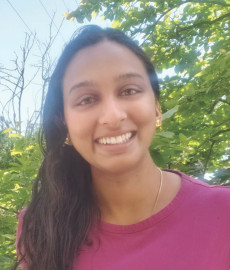Computing Sciences Welcomes New Alvarez Fellow, Aditi Krishnapriyan
May 18, 2020
By Kathy Kincade
Contact: cscomms@lbl.gov
A long-distance runner for many years, Aditi Krishnapriyan – the latest postdoctoral researcher to be awarded the prestigious Luis W. Alvarez Fellowship in Computing Sciences – brings a well-honed energy and intensity to her new position in Lawrence Berkeley National Laboratory’s Computational Research Division (CRD). Since joining CRD’s Data Analytics and Visualization Group earlier this year, she has hit the ground running and is already making headway on some early-stage projects.
Like many of her peers in computing sciences, Krishnapriyan’s interests are multifaceted and multi-disciplinary. Her background is in mathematical approaches for materials property prediction; in 2013 she earned a bachelor's degree in chemistry and physics from the University of California, Santa Barbara, and in December 2019 she was awarded a PhD in computational condensed matter physics and materials science from Stanford University, where she was a member of the Materials Computation and Theory Group. While at Stanford she also worked at Google, lending her curiosity and expertise to a deep learning project, and at Toyota Research Institute on a project using machine learning for scientific applications.
Along the way, Krishnapriyan’s studies have introduced her to a range of methodologies that continue to inspire her in new directions – like the proverbial pebble dropped in a pool of water. These days she is particularly interested in exploring aspects of applied math – such as topology, category theory, computational geometry, and graph theory – across a spectrum of scientific problems. One of the first projects she is working on in her new role as Alvarez Fellow is using topology and statistical mechanics to study condensed matter systems.
“A lot of my doctoral work was about using tools from machine learning and topology to predict properties of physical and scientific systems,” she said. “Now I'm going in the other direction and focusing on fundamental machine learning problems, while using intuition from physics and topology. I'm excited to ground this work in applications that will also accelerate scientific research.”
This isn’t Krishnapriyan’s first time working at a national laboratory. A native of Des Moines, Iowa, in 2014 she was a summer student at Berkeley Lab’s Molecular Foundry, and during grad school she spent part of her Department of Energy Computational Science Graduate Fellowship at Los Alamos National Laboratory. In 2018, she met Dmitriy Morozov – a research scientist in CRD who is her mentor for the two-year Alvarez Fellowship – at the Mathematical Sciences Research Institute hot-topics workshop, and a research collaboration soon followed.
“When I met Dmitriy, it seemed like the idea of using topology and machine learning to study materials systems hadn’t really been tapped into that much, so we worked on a collaboration showing this as a proof of concept,” she said. The result? A paper published last month in the Journal of Physical Chemistry C.
“Aditi is very enthusiastic and hands-on,” Morozov said. “She is new to topology but has the materials science background, and she is excited about the topics and dives into them. She is broadly and intellectually curious.”
When she is not delving into new research projects, Krishnapriyan enjoys reading, learning new languages, and – of course – long-distance running, which she is grateful to continue to pursue during the Bay Area’s current shelter-in-place guidelines.
“I’ve been running for a long time, and it is really nice that I can still do that on a regular basis, even though other things are on hold,” she said.
Of the Alvarez Fellowship, she added, “I was surprised to get it because I knew it is very competitive. But one of the nice things about it is that you get to be interdisciplinary and also pave your own research directions. Some of the tools in other fields are so powerful that combining them with a field that has been around for a while can bring about really big gains in both directions.”
About Computing Sciences at Berkeley Lab
High performance computing plays a critical role in scientific discovery. Researchers increasingly rely on advances in computer science, mathematics, computational science, data science, and large-scale computing and networking to increase our understanding of ourselves, our planet, and our universe. Berkeley Lab’s Computing Sciences Area researches, develops, and deploys new foundations, tools, and technologies to meet these needs and to advance research across a broad range of scientific disciplines.







 Instagram
Instagram YouTube
YouTube